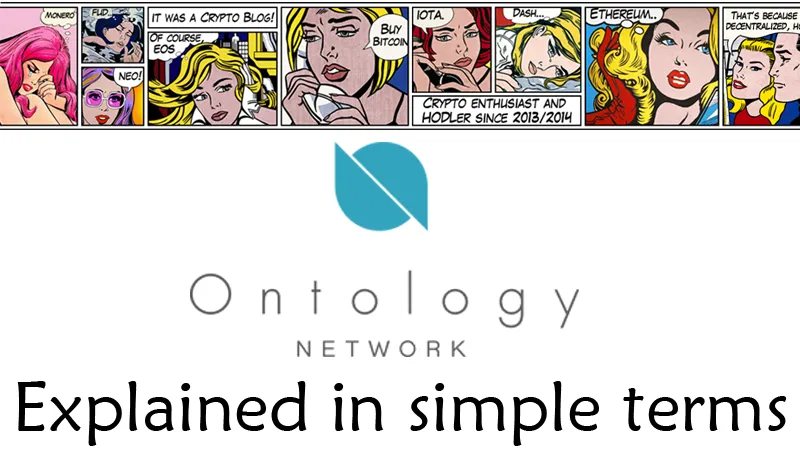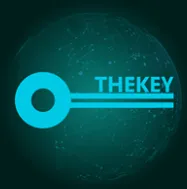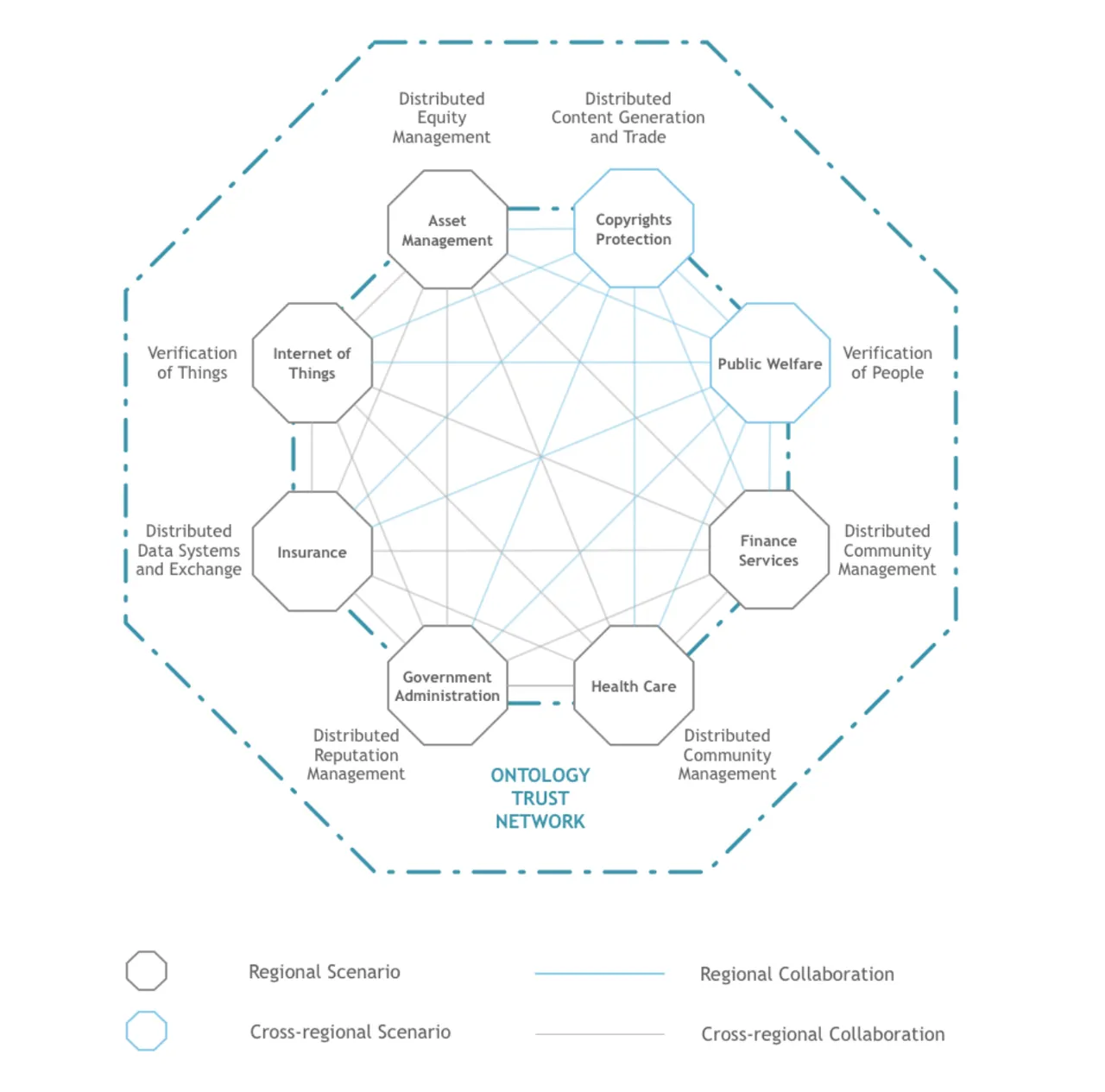
If you're a fan of NEO you may have caught wind of the Ontology (ONT) network and most likely, just like me, it confused the hell out of you with regards to what it exactly is. I took the plunge and delved into it to try and understand it, so I could translate my findings to you. Here is what I discovered.

ONTOLOGY (ONT)
Ontology is one of the more confusing projects I've researched, but also perhaps one of the more promising ones. It's subject matter can be rather dry at times, so bear with me as I try to explain this 'boring' project in the most easily digestible way I can think of.
For starters there is the parent company OnChain, of which Da Hongfei of NEO is the CEO. OnChain has two core projects, one of which is NEO and the other is Ontology. NEO is a public, open-source blockchain and Ontology is a closed, private blockchain counterpart. Together these two projects are part of the same ecosystem, and will be interoperable and in fact rely on eachother.
This means that dApps built on NEO are likely to make use of Ontology, and services on Ontology will be using NEO.
Most explanations on Ontology start with this rather confusing snippet of text. I'll post this for completeness but don't bother trying to understand it based on this text alone:
"Ontology Network is a blockchain/distributed ledger network which combines a distributed identity system, distributed data exchange, distributed data collaboration, distributed procedure protocols, distributed communities, distributed attestation, and various industry-specific modules. Together this builds the infrastructure for a peer-to-peer trust network which is cross-chain, cross-system, cross-industry, cross-application, and cross-device."
When I first read this, all I could see was something like "distributed blah-blah trust blockchain blah industry blah-blah trust application blah data distributed trust network". This must be the worst summary I have ever read on a project.
Further research clarified things for me. What it comes down to mainly is the distinction between NEO as a public blockchain and Ontology as a private blockchain (or blockchains.. plural), coupled with a difference on focus.
The benefits of a public blockchain are well known, but it has it's disadvantages too. Many things that require a very high (the highest) level of trust are perhaps not so suited to be stored on a public ledger. This applies for example to identity/personal information, or corporate data (corporations do not like the competition analyzing and spying on them) or even governments.
Ontology offers a solution by providing private blockchains to entities, which are then linked to the NEO ecosystem. What this means in practice is that, for example, an entity can start an identity verification service for NEO but which actually stores the sensitive ID information on a private Ontology blockchain. Since this information is stored on a private blockchain it enjoys a much higher degree of security than on a public blockchain, but being interoperable it allows for NEO to access this information and vice versa.
Ontology is in a sense the bridge that connects the digital world to the real world. A digital identity is fine, but how do you connect your digital identity in a trustable fashion to your real world identity? This is where Ontology comes in.
On Ontology large parties and stakeholders form a network of trust. This could be the government, large corporations and banks, all working together to form a network of private blockchains. The trust involved largely stems from the trust that people put into these stakeholders. I think this makes Ontology potentially the opposite of trust-less, which sounds like a bad thing but really isn't. After all, how is it even possible to verify that your digital identity matches your real-world identity without a trusted party like the government to verify you? There needs to be a real-world party which can vouch for your identity, be it the government or otherwise. Otherwise a digital identity can never be anything more than merely digital. These trusted parties, which we trust today as well and are in fact the providers of our real-world identity (documents), will be the ones which will form the foundation of trust on the Ontology network as well.
Matching identity to digital assets is hugely important, because this allows for proving that data belongs to individuals. Take for example the digitization of assets. Perhaps you want to tokenize ownership of a house. That's fine, and you distribute the tokens all around. But how do you prove that ownership of a token actually means you own part of that house? Who legally enforces it? Who legally attaches that part of the house to you personally and provides the legal foundation of this ownership, so when things go sour you are not left with a worthless token? Ontology provides a framework for the legalities surrounding these issues.


IS THIS COMPETING WITH THEKEY?
Digital identities are a huge part of the NEO design philosophy and it's aim to work with the existing world order. One project that has been making waves lately is THEKEY (TKY) which is an identity verification service for NEO. Shortly after the Ontology network was announced many people questioned it's role with regards to projects like THEKEY and whether they are in competition with eachother or not.The answer is no, they are not in competition but in fact complementary. The way to look at it is to see Ontology and NEO as a framework, and a project such as THEKEY actually builds a service that utilizes both frameworks to combine the strengths and benefits of both. This enables an identification services that has all the strengths of a private blockchain, yet which is usable and utilized on the public NEO blockchain.

PRO'S
Think about what strengths this provides! Where many public projects are working hard on integrating privacy features in order to attract corporate use, NEO offers a dual-ecosystem from the get-go where privacy is enabled for those use-cases which require it, and the public ledger is used for those use-cases where privacy is not wanted. I believe this will lead to an ecosystem where data itself can be private through Ontology, but value-ownership is transferred on the public NEO chain. This allows for privacy without enabling money-laundering, I believe.If the NEO blockchain is decentralized and trust-less, and the Ontology forms the trust-ed semi-decentralized (look at it like a circle of huge stakeholders who are invested in making the ecosystem a success and providing trust) intermediary that couples the digital world to the real world in a legally binding way then the vision of the entire ecosystem becomes more clear. I can see how this enables governments and large entities to work with the ecosystem, as it provides them the high degree of security and privacy that they require and enables them a happy balance between the wild west of true, full-scale decentralization and the benefits of blockchain on the other hand.


OPPORTUNITY
It's clear to me that NEO and Ontology's success are linked. If Ontology should fail then NEO will never be anything more than a dApp platform on the internet. But if Ontology succeeds as per NEO's vision then this is what will seperate the NEO ecosystem from all the other blockchains out there. Where other platforms struggle to create ways to mold their blockchains into usable, regulatory compliant platforms, NEO/Ontology provides a workable framework from the get-go and lowers the bar of entry for large entities significantly.It's also clear to me that the biggest use-cases for NEO are going to rely on Ontology as well as a core principle. Take for instance the matter of ownership of digital assets. The digital asset itself will be on NEO, but linking it's ownership to you personally will happen through Ontology.
Considering NEO's current market cap of $3.5 billion (and at it's high about $12.5 billion) and it's reliance on Ontology, which currently sits at a lowly $260 million, I would say Ontology is quite undervalued at the moment. Should NEO succeed in it's grand vision and continue to grow into the future, I've no doubt in my mind that Ontology will play a crucial role in it's success and will see wide-scale usage.

It is important to remember that digital assets, the actual value will be stored on NEO and that Ontology is meant for much smaller data-transactions (at a higher throughput). As such it should be expected that the NEO blockchain will always contain more value than Ontology due to it's nature. On the other hand, I also expect a lot of sensitive data to be stored and accessed pretty much non-stop by everything on NEO. This reliance on Ontology as a core project makes it a valuable thing in itself. With these things in mind I have a very hard time seeing Ontology remain at such a low market cap if NEO is to regain it's previous market cap or even go beyond. I'm getting the feeling this is a second chance to invest into NEO again, at super low prices.

ONT TOKEN
One reason why I feel this is a second chance at investing in NEO is because of the ONT token. Recently Ontology did an ONT airdrop for NEO hodlers and everybody who had NEO in their private wallet at the time of the snapshot will receive some ONT tokens.The ONT token is much like the NEO token, which is great! Right now ONT is simply a NEP-5 token on the NEO blockchain, but when it launches it's mainnet in Q2 2018 you will be able to exchange them for the 'real' ONT tokens on their own blockchain. ONT tokens operate the same way as NEO: You put them in a private wallet and they generate 'gas' in the form of ONG tokens. The process is supposed to be identical to generating NEO-GAS, and no active staking is required.

Right now the ONT token is not tradeable in many places, but you'll find it has been recently added to your favorite alt-coin exchange Binance. Currently the price of one ONT is slightly above $1 each. This makes it easy to snag up a bunch of them. I know I will: I love generating 'free' GAS and I look forward to earning ONG too.

All in all I like Ontology a lot. It's like a private-blockchain version of NEO and I believe it will be heavily used by corporations and governments and other entities. It takes away any objections that these entities may have with blockchain, and creates a hybrid bridge for them to connect their old-world status quo to the new-world of decentralization. Perhaps in the distant future true decentralization will out-compete them, but in the meantime Ontology offers them a way to connect their industry or sector to the world of blockchain in a frictionless way.
I also like that this is a complex project to understand. Truthfully my own grasp on it is not as tight as I'd like, at all. But this gives me confidence too: these confusing projects will scare away mainstream investors because they don't get it. It's the same reason why I got into NEO in the first place back during it's Antshares days when it's purpose was confusing to people. It's a great project, but the mainstream hasn't discovered it yet which means it's a great buy & hodl in my mind.
I don't recommend putting a large part of your portfolio into this though. ONT is still dependant on NEO which is dependant on Ethereum and/or Bitcoin and that's a lot of 'ifs' entering the equation. Still, if you believe in NEO's future then I do recommend throwing some money at this and see what happens. I myself am going to start accummulating this and hope to bring my holdings into the 2-3% range or so. Future growth should enable it to grow into a larger percentage, if all goes well, after that.
If you still don't understand Ontology or would like to know a little bit more, have a look at the video below that Datadash made which gives a pretty good overview of the project. There is also an AMA with the CEO of Ontology which I highly recommend reading.
>> To visit the Ontology Network website click here <<
